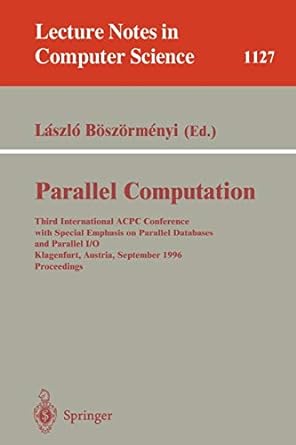Question
Using only notation given in the question, algebraically write the following using linear statements. The total number of applicants to be selected is equal to
Using only notation given in the question, algebraically write the following using linear statements. The total number of applicants to be selected is equal to the number predetermined by the program organizers. At least m percent of the selected applicants must be women. At least r percent of the selected applicants must be from non-stanbul regions. Write an objective to maximize the sum of the selected applicants' scores. Write an objective to minimize the sum of the selected applicants' rankings. Write an objective so that the last applicant selected has the best possible ranking. Hint: This is modeled as a min-max objective function, which is then linearized. (20 points) A home building store faces the following problem. Their customers demand plywood in the sizes of 4x3 meters, 4x5 meters, and 4x6 meters. Customer demand for these three sizes is estimated to be at least 20, 50, and 40, and customers are prepared to pay 7, 9, and 10 for each of these sheets, respectively. The store must generate these sizes by cutting up standard 4x8 meter sheets, each of which costs them These sheets are in unlimited supply. Furthermore, each cut costs the store 1.50. Maximizing profit, develop a linear integer model for finding an optimal cutting plan of 4x8 meter sheets. Clearly define your decision variables. (15 points) Fact: At least one optimal solution -if an optimal solution exists- of a linear program has to be an extreme (vertex, corner point). The below figure shows the graphical model of a linear program. The large numbers on the right (1, 2, and 3) indicate the constraints, while the small numbers (0, 1, 2, and 3) are the constraints' intersection points. The feasible region consists of the area to the left of 1, 2, and 3 together with x1 0 and x2 0 constraints. Three objective functions are under consideration, as indicated by three lines labeled A, B, and C. The arrows represent the directions of increasing objective function value. Objective B is parallel to constraint 3. In each of the below cases, specify the location of the optimal solution. If there is more than one optimal solution, characterize all of them and indicate which of these solutions the simplex algorithm can find. x2 x1 3 2 1 0 1 2 3 C A B Maximize A. Maximize B. Maximize C. Minimize A. Minimize B. Minimize C. Drop x1 0 and minimize C. (25 points) Apply the tabu search algorithm (Algorithm 15C) on page 895 in Chapter 15 to a TSP with 5 Generate your own distance matrix randomly -use integers- in Excel. Let your first solution be the one found by using the nearest neighbor algorithm. Let t max be 10. Once an interchange occurs, put the smaller indexed position on the tabu list for 2 iterations. Give your results as a table like in the book. Also, make sure to provide your distance matrix and your net changes for all possible interchanges during each iteration. You may solve this question in Excel for convenience. Note that the total distance includes the return trip to your starting point in the TSP.
Step by Step Solution
There are 3 Steps involved in it
Step: 1

Get Instant Access to Expert-Tailored Solutions
See step-by-step solutions with expert insights and AI powered tools for academic success
Step: 2

Step: 3

Ace Your Homework with AI
Get the answers you need in no time with our AI-driven, step-by-step assistance
Get Started


